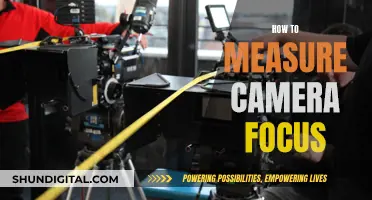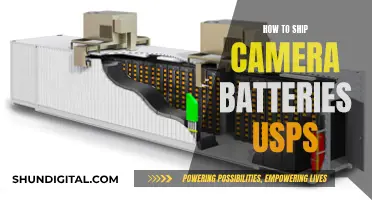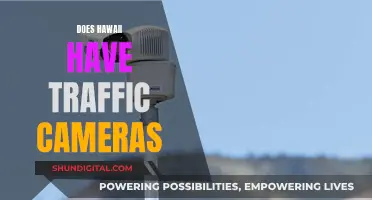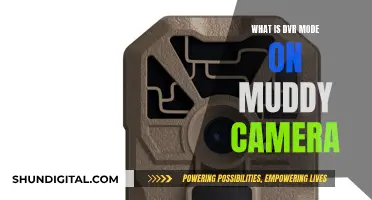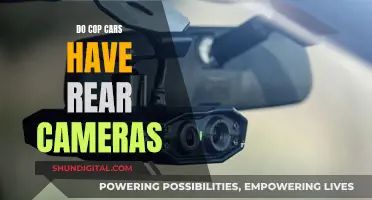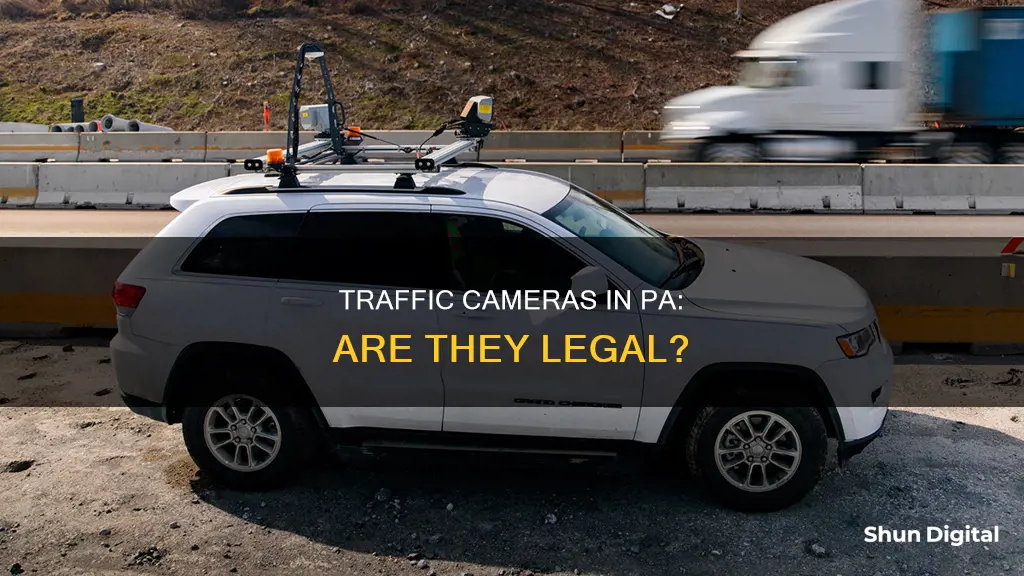
Traffic cameras are legal in Pennsylvania. Cities in the state may choose to install these cameras at intersections where car accidents are most common. Philadelphia, for instance, has traffic cameras throughout the city and suburbs. However, Harrisburg does not have any red-light cameras. While traffic cameras are generally permitted, there are specific guidelines and regulations that users must follow to avoid legal challenges. For instance, the Pennsylvania Wiretap Law prohibits recording any electronically transmitted conversations.
| Characteristics | Values |
|---|---|
| Are traffic cameras legal in PA? | Yes, limited red light cameras are legal in Pennsylvania. |
| Which cities in PA have traffic cameras? | Philadelphia, Pittsburgh, and municipalities with a population of over 20,000. |
| Are there any conditions for installing traffic cameras? | Cities must have police departments accredited by the Pennsylvania Chiefs of Police Association in Bucks, Chester, Delaware, and Montgomery Counties and have a local ordinance permitting the use of red light enforcement cameras. |
| What is the purpose of traffic cameras? | To reduce the chances of dangerous intersection collisions without requiring a large police presence. |
| What happens if you get a ticket for running a red light? | You will receive a ticket in the mail with a fine of at least $100. |
| Do you get points on your license for a red light ticket? | No, if you plead guilty and pay the fine, you won't receive any points. |
| Can you appeal a red light ticket? | Yes, you can plead not guilty and challenge the ticket in court, especially if you believe it was issued in error or if someone else was driving your car. |
| What happens if you don't pay a red light ticket? | The municipality that issued the ticket can send it to a collection agency, resulting in additional late fees and collection fees. |
| Are there speed cameras in PA? | Yes, there are speed cameras in highway work zones and specific locations in Philadelphia, such as Roosevelt Boulevard. |
| How do speed cameras work? | They detect vehicles travelling 11 mph or more over the speed limit and capture images of the vehicle along with related information. |
| What are the penalties for speeding? | First-time offenders receive a warning, second-time offenders pay a $75 fine, and subsequent offenses cost $150. |
What You'll Learn

Red light cameras in Pennsylvania
Red light cameras are legal in Pennsylvania and are designed to reduce the chances of dangerous intersection collisions without the need for a large police presence. Cities in Pennsylvania may opt to install these cameras at intersections where car accidents are most common. While Harrisburg does not have any red light cameras, Philadelphia has traffic cameras throughout the city and suburbs. Pittsburgh also has red light cameras. Municipalities with a population of over 20,000 and police departments accredited by the Pennsylvania Chiefs of Police Association in Bucks, Chester, Delaware, and Montgomery Counties may also install red light cameras, provided they have a local ordinance permitting their use.
If you run a red light in Pennsylvania, you will receive a ticket in the mail with a fine of $100. You can either pay the ticket and plead guilty, or plead not guilty and challenge the ticket in court. If you simply pay the fine, you will not receive points on your license. However, if a police officer pulls you over for running a red light, you will receive a citation with a larger fine and points on your license.
It is important to note that if you do not pay your red light camera ticket, it can be sent to a collection agency, resulting in additional late fees and collection charges. Therefore, it is advisable to address any red light camera tickets promptly with the help of a skilled traffic ticket lawyer.
In addition to red light cameras, Pennsylvania also utilizes automated speed ticket cameras, particularly in highway work zones and school zones. These cameras issue citations for speeding in active work zones, with fines ranging from $75 for first-time offenders to $150 for subsequent offenses.
Streaming Surveillance Footage to a Projector: A Step-by-Step Guide
You may want to see also

Work Zone Speed Safety Cameras
The use of speed ticket cameras in Pennsylvania is legal. The Pennsylvania Department of Transportation (PennDOT), the Pennsylvania Turnpike Commission (PA Turnpike), and the Pennsylvania State Police (PSP) are implementing a statewide Work Zone Speed Safety Cameras (WZSSC) program. The goal of the WZSSC program is to reduce speeds in work zones, improve driver behavior, and promote work zone safety for workers and motorists.
The WZSSC program uses vehicle-mounted or apparatus-based systems to detect the speed of passing vehicles. When a vehicle is travelling 11 miles per hour (mph) or more over the speed limit, the system captures images of the vehicle and related information such as the speed limit, speed, location, date, and time. This information constitutes a violation, which is then transferred to a back-office system where the registered owner information is obtained. If the violation passes quality assurance and control checks, a notice of violation is mailed to the registered owner.
First-time violations result in a written warning with no financial penalty. Second and subsequent violations carry financial penalties of $75 and $150, respectively. These penalties are civil in nature and do not affect the driver's license or result in jail time. The revenue generated from these fines is used to cover program expenditures, with any excess revenue going towards improvement projects, enforcements, and countermeasures to enhance work zone and highway safety.
The WZSSC program is designed to complement existing enforcement measures and change driver behavior to create a safer environment for workers and motorists in work zones. The locations of the WZSSC units are available on the PennDOT website, with active, paused, and completed projects clearly marked. Warning signs are also placed in advance of work zones with active WZSSC systems, as required by law.
Apple Care: Cracked Camera Coverage Explained
You may want to see also

Video surveillance laws for tenants
In Pennsylvania, cities may opt to install traffic cameras at intersections where car accidents are most common. Philadelphia, for example, has traffic cameras throughout the city and suburbs.
Now, here is some information on video surveillance laws for tenants:
Installation of Surveillance Cameras by Tenants
In most states, it is illegal for tenants to install surveillance cameras in apartment complex areas and rental units where others have a reasonable expectation of privacy. Tenants can, however, install cameras within their units if the lease permits it and they do not damage the building. Tenants must also respect the privacy laws concerning other tenants and cannot aim cameras into other units or record audio without their consent.
Installation of Surveillance Cameras by Landlords
Landlords, rental property managers, and building owners can install security cameras in all public areas of the property to monitor and maintain security. However, they should not be used to spy on tenants and should not be positioned to look through the windows of the units in the building or neighbouring buildings.
Notification of Surveillance
Tenants or parties involved in the rental agreement must be informed of the presence of video surveillance, hidden cameras, CCTV, or any video recording equipment on the rented property. While not a legal requirement, posting signage indicating surveillance cameras can enhance security and deter burglars.
Legality of Camera and Audio Recording Devices
While indoor and outdoor cameras are legal, the installation of audio recording devices depends on the state. According to the Federal Wiretap Act, "it is illegal to intentionally or purposefully intercept, disclose, or use the contents of any wire, oral, or electronic communication through the use of a device." Some states prohibit the installation of audio recording devices in apartment buildings, while others require tenants to be informed of their locations.
Consent for Audio Recording
In some states, if tenants are informed of the presence of audio recording devices and still have private conversations near them, they are considered to have consented to the recording of their conversations. In other states, the property manager or owner must obtain written consent from tenants to record audio legally.
Visibility of Cameras
In all states, security cameras must be visible; hidden cameras are not allowed.
Storage of Footage
Storage durations for video footage vary by jurisdiction and the property's policies. Generally, footage is kept for a period balancing security needs and privacy rights, ranging from a few days to several weeks.
Focusing Your Camera on Self-Timer: Tips and Tricks
You may want to see also

Surveillance camera laws for homeowners
In Pennsylvania, traffic cameras are legal. Cities in the state may choose to install cameras at intersections where car accidents are most common. For instance, Philadelphia has traffic cameras throughout the city and suburbs.
In Pennsylvania, security camera laws generally allow homeowners to use surveillance cameras for legitimate purposes, such as property protection. However, there are specific guidelines and regulations that users must follow to avoid legal issues. Here are some key points for homeowners in Pennsylvania regarding the use of surveillance cameras:
- Homeowners can typically install security cameras to monitor their property, but it is essential to respect the privacy of others. Avoid pointing cameras at areas where individuals have a reasonable expectation of privacy, such as neighbours' bedroom windows.
- Pennsylvania law permits the surveillance of areas visible from a neighbour's property without the use of enhanced equipment like telescopes or drones. For example, it may be reasonable for a neighbour to have a camera monitoring package deliveries or visitors.
- The state has strict regulations regarding audio recordings. Pennsylvania is a "two-party consent" state, which means that both parties must be aware of and consent to the recording of any private conversation. This includes telephone conversations.
- The Pennsylvania Wiretap Law makes it a felony to record oral or telephone communication without the consent of all parties. Violators may face civil liability and criminal penalties.
- It is illegal to use surveillance footage for purposes that violate another person's reasonable expectation of privacy or for illegal activities such as harassment or stalking.
- If you have concerns about a neighbour's surveillance cameras, it is recommended to first try having a respectful conversation with them. You can express your privacy concerns and request that they adjust their camera angles or agree on privacy boundaries.
- If communication fails or you believe your privacy rights are being violated, you can consult an attorney to understand your legal options.
The Standalone Camera Raw: Is It Possible?
You may want to see also

Speed ticket cameras in Philadelphia
Speed cameras are legal in Philadelphia, and they are used to enforce traffic laws and reduce the number of speeding-related incidents. The Philadelphia Parking Authority (PPA) has implemented speed safety cameras along several dangerous stretches of highway on Roosevelt Boulevard as part of their Vision Zero Campaign. These cameras are programmed to capture speeding vehicles by taking photographs of license plates and short videos when radar detects a speed of at least 11 mph over the limit. The PPA's Automated Speed Enforcement Camera Report details the locations of these speed cameras.
The process of receiving a ticket and paying a fine for speeding in Philadelphia is outlined on the PPA website. Violators will receive a mailed notice and fine, with fines ranging from $100 to $150 depending on the speed. The PPA emphasizes that the goal of the program is to improve safety and reduce speeding-related injuries and fatalities, rather than generating revenue. The money collected from fines is used to cover program costs and fund transportation safety grants.
It's important to note that speed camera violations in Philadelphia are handled as non-moving civil violations. These violations do not result in points on your license or increased insurance costs. However, failure to pay the fine, request a review, or contest liability in a timely manner may result in additional fees. Disputes regarding speed camera violations are administered by Philadelphia's Office of Administrative Review, and virtual hearings can be requested through the provided instructions.
In addition to the speed cameras on Roosevelt Boulevard, Philadelphia has also authorized the use of speed ticket cameras in highway work zones and school zones. The legislation for the continued use of these cameras was approved by lawmakers and signed into law by Governor Josh Shapiro. This law includes provisions for warning signs before active work zones and the requirement for vehicle owners to receive mailed tickets if they exceed the posted speed limit.
Understanding Camera's Selective Focus: Creative Photography Technique
You may want to see also
Frequently asked questions
Yes, cities in Pennsylvania may opt to install traffic cameras at intersections where car accidents are most common.
Philadelphia has traffic cameras throughout the city and suburbs. Other cities and suburban towns with traffic cameras include Pittsburgh, Abington, Springfield, and municipalities with a population of over 20,000 in Bucks, Chester, Delaware, and Montgomery Counties.
You will receive a ticket in the mail with a fine of at least $100. You can either pay the ticket, which means pleading guilty and paying the fine, or you can plead not guilty and challenge the ticket in court.
No, if you plead guilty and pay the fine for a red light camera ticket, you won't get points on your license. This is different from a ticket issued by a police officer for running a red light, which would result in a citation with a larger fine and points on your license.


